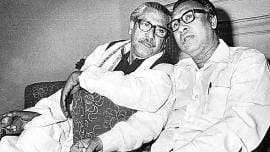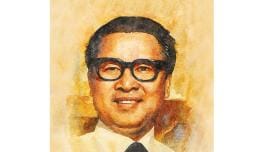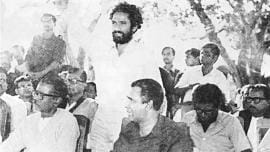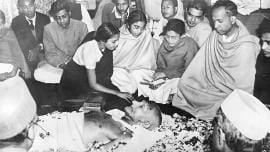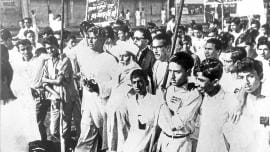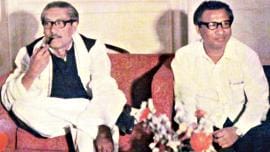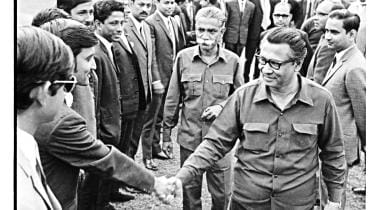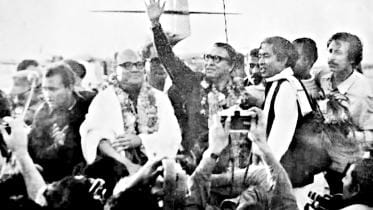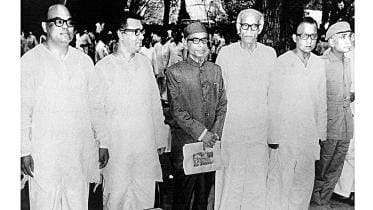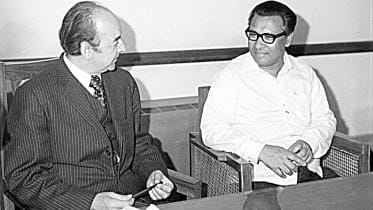Our finest representative of liberal politics
22 July 2025, 18:00 PM
A life for Bangladesh
Remembering Tajuddin Bhai
22 July 2025, 18:00 PM
A life for Bangladesh
‘Tajuddin’s place in history should be seen in terms of his wartime leadership’
22 July 2025, 18:00 PM
A life for Bangladesh
On the path of dawn
22 July 2025, 18:00 PM
A life for Bangladesh
Tajuddin’s unfinished revolution
22 July 2025, 18:00 PM
A life for Bangladesh
Self and Society: Tajuddin’s formative years
22 July 2025, 18:00 PM
A life for Bangladesh
Tajuddin Ahmad man who shaped history
22 July 2025, 18:00 PM
A life for Bangladesh
An atypical leader
22 July 2025, 18:00 PM
A life for Bangladesh
‘The trial of the jail killing case should be reopened’
22 July 2025, 18:00 PM
A life for Bangladesh
‘Tajuddin Ahmad seems like a Greek tragic hero who had all the great qualities but destiny was against him’
22 July 2025, 18:00 PM
A life for Bangladesh
Our finest representative of liberal politics
I did not personally know Tajuddin Ahmad, but he was a contemporary of ours, and the politics he practised was within the Awami League—though there were different strands within the party.
22 July 2025, 18:00 PM
Remembering Tajuddin Bhai
I first met Tajuddin Ahmad—or Tajuddin Bhai, as I knew him—in the 1960s, during the pre-Liberation period. After I joined the Awami League, Bangabandhu told me to meet Tajuddin Ahmad, as he would answer all my questions on politics and the party, and that he possessed deep knowledge of both politics and people.
22 July 2025, 18:00 PM
‘Tajuddin’s place in history should be seen in terms of his wartime leadership’
The Daily Star (TDS): How do you view Tajuddin Ahmad’s early political journey and his emergence as a key national figure?
22 July 2025, 18:00 PM
On the path of dawn
Every moment of the night of 25 March 1971 and the following two months will always shine brightly in the depths of my memory. Even though I might not be able to express all those living memories in words, I will try to articulate a possible description of the events.
22 July 2025, 18:00 PM
Tajuddin’s unfinished revolution
As a person, Tajuddin Ahmad was an idealist. In his personal life and professional conduct, he was disciplined and guided by a deep sense of restraint and propriety.
22 July 2025, 18:00 PM
Self and Society: Tajuddin’s formative years
No leader emerges in a vacuum. The making of a political figure is deeply influenced by the social structures around them—family, religion, education, and the broader environment all leave lasting imprints.
22 July 2025, 18:00 PM
Tajuddin Ahmad man who shaped history
The historic journey of the people of Eastern Bengal in the middle half of the last century, to be more precise from 1947 to 1971, was an amazing story with great impact on the post-colonial social and political development of the subcontinent.
22 July 2025, 18:00 PM
An atypical leader
In the fraught political environment of Bangladesh, where the image of politicians and the idea of politics have remained systematically devalued and perverted, Tajuddin Ahmad (TA) dared to be different and charted his journey according to his own intellectual and moral imperatives.
22 July 2025, 18:00 PM
‘The trial of the jail killing case should be reopened’
The Daily Star (TDS): We all know Tajuddin Ahmad as a leader, but how was he as a father?
22 July 2025, 18:00 PM
‘Tajuddin Ahmad seems like a Greek tragic hero who had all the great qualities but destiny was against him’
The Daily Star (TDS): What inspired you to make the documentary Tajuddin Ahmad: An Unsung Hero?
22 July 2025, 18:00 PM
A man hard to find
Tajuddin Ahmad was tragically killed in jail on 3 November 1975. His life was cut short at the age of 50. Yet, in this brief life, he had the rare opportunity to perform great service to his country — and he made full use of it.
22 July 2025, 18:00 PM
Our moral inheritance Tajuddin Ahmad’s call to national conscience
I recall much of my formative youth in the United States spent sharing a home with struggling guests and families. Sharmin Ahmad “Reepi,” my mother and Tajuddin’s eldest daughter, once hosted a family of six whose two-month stay turned into several years until the guests could get back on their feet.
22 July 2025, 18:00 PM
Reading his diaries and understanding the man
I do not remember who gave me the book—it may have been a friend, colleague, or a student of mine.
22 July 2025, 18:00 PM
An unsung hero: Tajuddin Ahmad and the Bangladesh revolution
The period between 1945 and 1979 was one of Cold War and decolonisation. The Cold War entered a different trajectory with the rapprochement between China and the US and the Iranian Revolution.
22 July 2025, 18:00 PM
The forgotten luminary of Bangladesh’s liberation war
History has a cruel way of dimming the light of those who served with quiet dignity while amplifying the voices of those who demanded attention. In the pantheon of Bangladesh’s founding fathers, few figures have been as systematically overlooked—and arguably mistreated—as Tajuddin Ahmed, the nation’s first Prime Minister.
22 July 2025, 18:00 PM
‘Tajuddin was objective, fact-based — quite unlike many other Awami League leaders’
The Daily Star (TDS): How and when did you first come into contact with Tajuddin Ahmad?
22 July 2025, 18:00 PM



